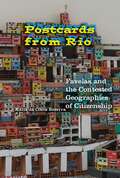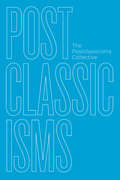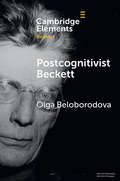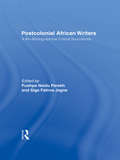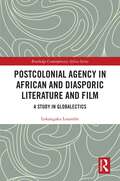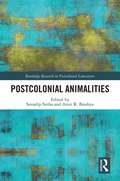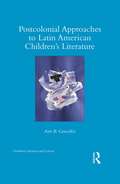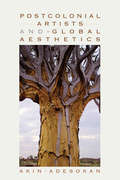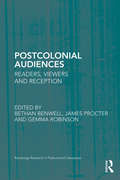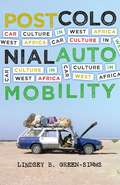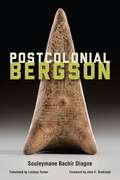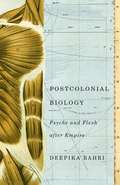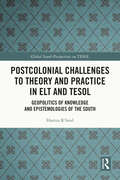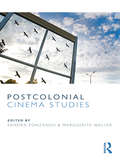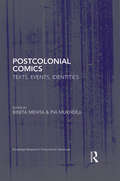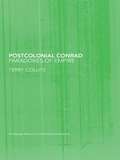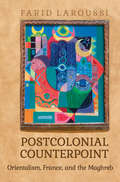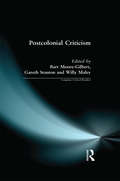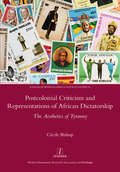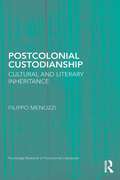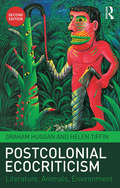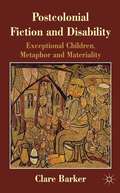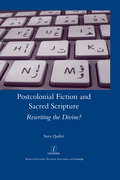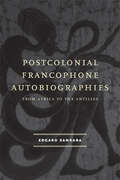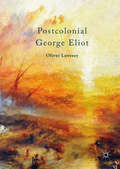- Table View
- List View
Postcards from Rio: Favelas and the Contested Geographies of Citizenship
by Kátia da BezerraThrough the analysis of a variety of favela-based visual cultural productions by young people and contemporary theorists, Postcards from Rio examines the complex relationship between citizenship and urban space in contemporary Rio de Janeiro.By analyzing videos and photographs, Kátia da Costa Bezerra illustrates how citizens of favelas are reshaping their sense of belonging as subjects and as a legitimate part of the city. A groundbreaking study that examines more deeply the relationship between urban space, citizenship, and imagery originating in the favelas, Postcards from Rio sheds crucial light on how contemporary lenses are defining and mediating the meanings of space and citizenship as strategies of empowerment. The city emerges as a political space where multiplicities of perspectives are intertwined with demands for more inclusive forms of governance.
Postclassicisms: The Postclassicisms Collective
by The Postclassicisms CollectiveMade up of nine prominent scholars, The Postclassicisms Collective aims to map a space for theorizing and reflecting on the values attributed to antiquity. The product of these reflections, Postclassicisms takes up a set of questions about what it means to know and care about Greco-Roman antiquity in our turbulent world and offers suggestions for a discipline in transformation, as new communities are being built around the study of the ancient Greco-Roman world. Structured around three primary concepts—value, time, and responsibility—and nine additional concepts, Postclassicisms asks scholars to reflect upon why they choose to work in classics, to examine how proximity to and distance from antiquity has been—and continues to be—figured, and to consider what they seek to accomplish within their own scholarly practices. Together, the authors argue that a stronger critical self-awareness, an enhanced sense of the intellectual history of the methods of classics, and a greater understanding of the ethical and political implications of the decisions that the discipline makes will lead to a more engaged intellectual life, both for classicists and, ultimately, for society. A timely intervention into the present and future of the discipline, Postclassicisms will be required reading for professional classicists and students alike and a model for collaborative disciplinary intervention by scholars in other fields.
Postcognitivist Beckett (Elements in Beckett Studies)
by Olga BeloborodovaThe aim of this Element is to offer a reassessment of Beckett's alleged Cartesianism using the theoretical framework of extended cognition – a cluster of present-day philosophical theories that question the mind's brain-bound nature and see cognition primarily as a process of interaction between the human brain and the environment it operates in. The principal argument defended here is that, despite the Cartesian bias introduced by early Beckett scholarship, Beckett's fictional minds are not isolated 'skullscapes'. Instead, they are grounded in interaction with their fictional storyworlds, however impoverished those may have become in the later part of his writing career.
Postcolonial African Writers: A Bio-bibliographical Critical Sourcebook
by Pushpa Naidu Parekh Siga Fatima JagneThis reference book surveys the richness of postcolonial African literature. The volume begins with an introductory essay on postcolonial criticism and African writing, then presents alphabetically arranged profiles of some 60 writers, including Chinua Achebe, Nadine Gordimer, Bessie Head, Doris Lessing, Tsitsi Dangarembga, Tahbar Ben Jelloun, among others. Each entry includes a brief biography, a discussion of major works and themes that appear in the author's writings, an overview of the critical response to the author's work, and a bibliography of primary and secondary sources. These profiles are written by expert contributors and reflect many different perspectives. The volume concludes with a selected general bibliography of the most important critical works on postcolonial African literature.
Postcolonial Agency in African and Diasporic Literature and Film: A Study in Globalectics (Routledge Contemporary Africa)
by Lokangaka LosambeThis book chronicles the rise and the development of postcolonial agency since Africa’s encounter with Western modernity through African and African diaspora literature and film. Using African and African diasporic imaginaries (creative writings, autobiographies, polemical writings, and filmic media), the author shows how African subjects have resisted enslavement and colonial domination over the past centuries, and how they have sought to reshape "global modernity". Authors and film makers whose works are examined in detail include Olaudah Equiano, Haile Gerima, Amma Asante, George Washington Williams, William Sheppard, Wole Soyinka, Dani Kouyaté, Chris Abani, Chimamanda Adichie, and Leila Aboulela. Providing a critical study of nativism, hybridity and post-hybrid conjunctive consciousness, this book will be of interest to students and scholars of African and African diasporic literature, history, and cultural studies.
Postcolonial Animalities (Routledge Research in Postcolonial Literatures)
by Amit R. Baishya Suvadip SinhaPostcolonial Animalities, co-edited by Suvadip Sinha and Amit R. Baishya, brings together ten essays to consider the interfaces between "human" and "animal" and the concrete presence of animals in postcolonial cultural production. This edited collection critiques monohumanist conceptions of the "human" and considers the co-constitutiveness of imaginaries of the human with grammars of animality. One of the central contributions of this volume is to decolonize existing conceptualizations of the human-animal relationship, and to consider the material representation of animals within the realm of colonial and postcolonial cultural production from the perspective of ethical alterity and alternative narratives of anticolonial and postcolonial politics. The volume also explores entanglements of race and species in colonial and neocolonial frameworks without transforming such inquiries into a zero-sum game that privileges one category over another. The essays in the volume, focusing on multiple geographical locations ranging from South Asia, Southeast Asia, post-Ottoman Turkey, the Caribbean, Australia, South Africa and Palestine/Israel, historicizes and understands multispecies, interspecies and transspecies encounters, affiliations and connections in and through their localized dimensions, and studies human-animal encounters in their varied and complex affective relationalities. Through such inquiries, the volume considers how modes of representing animals, including located forms of anthropomorphism and zoomorphism, help us think-with and be-with different animals.
Postcolonial Approaches to Latin American Children’s Literature (Children's Literature and Culture)
by Ann GonzálezIn this volume González explores how the effects of a traumatic colonial experience are (re)presented to Latin American children today, almost two centuries after the dismantling of colonialism proper. Central to this study is the argument that the historical constraints of colonialism, neocolonialism, and postcolonialism have generated certain repeating themes and literary strategies in children’s literature throughout the Spanish-speaking Americas. From the outset of Spanish domination, fundamental tensions emerged between the colonizers and native groups that still exist to this day. Rather than a felicitous mixing of these two opposing groups, the mestizo is caught between contrasting worldviews, contending explanations of reality, and different values, beliefs, and epistemologies (that is, different ways of seeing and knowing). Postcolonial subjects experience these contending cultural beliefs and practices as a double bind, a no-win situation, in which they feel pressured by mutually exclusive expectations and imperatives. Latin American mestizos, therefore, are inevitably conflicted. Despite the vastness of the geography in question and the innumerable variations in regional histories, oral traditions, and natural settings, these contradictory demands create a pervasive dynamic that penetrates the very fabric of society, showing up intentionally or not in the stories passed from generation to generation as well as in new stories written or adapted for Spanish-speaking children. The goal of this study, therefore, is to examine a variety of children’s texts from the region to determine how national and hemispheric perceptions of reality, identity, and values are passed to the next generation. This book will appeal to scholars in the fields of Latin American literary and cultural studies, children’s literature, postcolonial studies, and comparative literature.
Postcolonial Artists and Global Aesthetics
by Akinwumi AdesokanWhat happens when social and political processes such as globalization shape cultural production? Drawing on a range of writers and filmmakers from Africa and elsewhere, Akin Adesokan explores the forces at work in the production and circulation of culture in a globalized world. He tackles problems such as artistic representation in the era of decolonization, the uneven development of aesthetics across the world, and the impact of location and commodity culture on genres, with a distinctive approach that exposes the global processes transforming cultural forms.
Postcolonial Audiences: Readers, Viewers and Reception (Routledge Research in Postcolonial Literatures)
by James Procter Bethan Benwell Gemma RobinsonWithout readers and audiences, viewers and consumers, the postcolonial would be literally unthinkable. And yet, postcolonial critics have historically neglected the modes of reception and consumption that make up the politics, and pleasures of meaning-making during and after empire. Thus, while recent criticism and theory has made large claims for reading; as an ethical act; as a means of establishing collective, quasi-political consciousness; as identification with difference; as a mode of resistance; and as an impulsion to the public imagination, the reader in postcolonial literary studies persists as a shadowy figure. This collection answers the now pressing need for a distinctively postcolonial take on the rapidly expanding area of reader and reception studies. Written by some of the top scholars in the field, these essays reveal readers and reception to be varied and profoundly unstable subjects that challenge many of our assumptions and preconceptions of the postcolonial – from the notion of reading as national fellowship to the demands of an ethics of reading.
Postcolonial Automobility: Car Culture in West Africa
by Lindsey B. Green-SimmsFor more than a century cars have symbolized autonomous, unfettered mobility and an increasingly global experience. And yet, they are often used differently outside the centers of global capitalism. This pioneering book considers how, through the lens of the automobile, we can assess the pleasures, dangers, and limits of global modernity in West Africa. Through new and provocative readings of famous plays, novels, and films, as well as recent popular videos, Postcolonial Automobility reveals the surprising ways in which automobility in the region is, at once, an everyday practice, an ethos, a fantasy of autonomy, and an affective activity intimately tied to modern social life. Lindsey B. Green-Simms begins with the history of motorization in West Africa from the colonial era to the decolonizing decades after World War II, and addresses the tragedy of car accidents through a close reading of Wole Soyinka&’s 1965 postindependence play The Road. Shifting to screen media, she discusses Ousmane Sembene&’s Xala and Jean-Pierre Bekolo&’s Quartier Mozart and reviews popular, low-budget Nollywood films. Finally, Green-Simms considers how feminist texts rewrite and work in dialogue with the male-centered films and novels where the car stands in for patriarchal power and capitalist achievement.Providing a unique perspective on technology in Africa—one refusing to be confined to narratives of either underdevelopment or inevitable progress—and covering a broad range of interdisciplinary material, Postcolonial Automobility will appeal not only to scholars and students of African literature and cinema but also to those in postcolonial and globalization studies.
Postcolonial Bergson
by Souleymane Bachir DiagneHenri Bergson has been the subject of keen interest within French philosophy ever since being championed by Gilles Deleuze and others. Yet his influence extends well beyond European philosophy, especially within Africa and South Asia. Postcolonial Bergson traces the influence of Bergson’s thought through the work of two major figures in the postcolonial struggle, Muhammad Iqbal and Léopold Sédar Senghor. Poets and statesmen as well as philosophers, both of these thinkers—the one Muslim and the other Catholic—played an essential political and intellectual role in the independence of their respective countries. Both found, in Bergson’s work, important support for their philosophical, cultural, and political projects.For Iqbal, a founding father of independent Pakistan, Bergson’s conceptions of time and creative evolution resonated with the need for the “reconstruction of religious thought in Islam,” a religious thought newly able to incorporate innovation and change. For Senghor, Bergsonian ideas of perception, intuition, and élan vital—filtered in part through the work of the French philosopher Pierre Teilhard de Chardin—proved crucial for thinking about African art, as well as foundational for his formulations of African socialism and his visions of an unalienated African future.At a moment of renewed interest in Bergson’s philosophy, this book, by a major figure in both French and African philosophy, gives an expanded idea of the political ramifications of Bergson’s thought in a postcolonial context.
Postcolonial Biology: Psyche and Flesh after Empire
by Deepika BahriAlthough the body has been a vast subject for postcolonial studies, few theorists have attempted to go beyond the simple mixing of races in examining the impact of colonialism on the colonized body. However, as Deepika Bahri argues, it is essential to see the postcolonial body in a variety of forms: as capable of transformation not only in psyche and outward behavior but also in flesh and blood. European colonizers brought new ways of seeing the body in matters as basic as how to eat, speak, sit, shit, or spit. As nations decolonized, these imperialistic ideas remained, becoming part of the global economy of the body. In Postcolonial Biology, Bahri argues that the political challenges of the twenty-first century require that we deconstruct these imperial notions of the body, as they are fundamental to power structures governing today&’s globalized world.Postcolonial Biology investigates how minds and bodies have been shaped by colonial contact, to create deeply embedded hierarchies among the colonized. Moving beyond &“North/South&” thinking, Bahri reframes the questions of postcolonial bodies to address all societies, whether developed or developing. Engaging in innovative, highly original readings of major thinkers such as Adorno, Horkheimer, Derrida, and Fanon, this book brings an important new focus to the field of postcolonial studies—one that is essential to understanding the ideas and conflicts that currently dominate the global order.
Postcolonial Challenges to Theory and Practice in ELT and TESOL: Geopolitics of Knowledge and Epistemologies of the South (Global South Perspectives on TESOL)
by Hamza R'boulDrawing on the underrepresentation of the Global South in global knowledge production with a focus on the existing inequalities, the book highlights the importance of postcolonial narratives in Global Southern epistemologies in ELT and TESOL. Chapters consider the epistemological landscapes of these fields, their dedication to English teaching and English-related topics, and the intersection of the coloniality of language and the supremacy of English worldwide. The book explores the type of discussion that is needed to advance a more nuanced understanding of sociopolitical circumstances and how they shape our academic practices and theorizations of ELT and TESOL. In doing so, chapters examine the current geopolitics of knowledge that is found in journal publishing, citing how it favours the Global North, and further exploring ways of decolonizing language practices, teaching approaches and research cultures. Calling for greater visibility and recognition of Southern ways of knowing within ELT and TESOL practice and research, the book will be essential reading for scholars, researchers and students of TESOL, ELT, applied linguistics and multilingualism.
Postcolonial Cinema Studies
by Sandra Ponzanesi Marguerite WallerThis collection of essays foregrounds the work of filmmakers in theorizing and comparing postcolonial conditions, recasting debates in both cinema and postcolonial studies. Postcolonial cinema is presented, not as a rigid category, but as an optic through which to address questions of postcolonial historiography, geography, subjectivity, and epistemology. Current circumstances of migration and immigration, militarization, economic exploitation, racial and religious conflict, enactments of citizenship, and cultural self-representation have deep roots in colonial/postcolonial/neocolonial histories. Contributors deeply engage the tense asymmetries bequeathed to the contemporary world by the multiple,diverse, and overlapping histories of European, Soviet, U.S., and multi-national imperial ventures. With interdisciplinary expertise, they discover and explore the conceptual temporalities and spatialities of postcoloniality, with an emphasis on the politics of form, the ‘postcolonial aesthetics’ through which filmmakers challenge themselves and their viewers to move beyond national and imperial imaginaries. Contributors include: Jude G. Akudinobi, Kanika Batra, Ruth Ben-Ghiat, Shohini Chaudhuri, Julie F. Codell, Sabine Doran, Hamish Ford, Claudia Hoffmann, Anikó Imre, Priya Jaikumar, Mariam B. Lam, Paulo de Medeiros, Sandra Ponzanesi, Richard Rice, Mireille Rosello and Marguerite Waller.
Postcolonial Comics: Texts, Events, Identities (Routledge Research in Postcolonial Literatures)
by Binita Mehta and Pia MukherjiThis collection examines new comic-book cultures, graphic writing, and bande dessinée texts as they relate to postcolonialism in contemporary Anglophone and Francophone settings. The individual chapters are framed within a larger enquiry that considers definitive aspects of the postcolonial condition in twenty-first-century (con)texts. The authors demonstrate that the fields of comic-book production and circulation in various regional histories introduce new postcolonial vocabularies, reconstitute conventional "image-functions" in established social texts and political systems, and present competing narratives of resistance and rights. In this sense, postcolonial comic cultures are of particular significance in the context of a newly global and politically recomposed landscape. This volume introduces a timely intervention within current comic-book-area studies that remain firmly situated within the "U.S.-European and Japanese manga paradigms" and their reading publics. It will be of great interest to a wide variety of disciplines including postcolonial studies, comics-area studies, cultural studies, and gender studies.
Postcolonial Conrad: Paradoxes of Empire (Routledge Research in Postcolonial Literatures #Vol. 12)
by Terry CollitsWinner of the 2006 NSW Prize for Literary Scholarship. The work of Joseph Conrad has been read so disparately that it is tempting to talk of many different Conrads. One lasting impression however, is that his colonial novels, which record encounters between Europe and Europe’s ‘Other’, are highly significant for the field of post-colonial studies. Drawing on many years of research and a rich body of criticism, Postcolonial Conrad not only presents fresh readings of his novels of imperialism, but also maps and analyzes the interpretative tradition they have generated. Terry Collits first examines the reception of the author’s work in terms of the history of ideas, literary criticism, traditions of ‘Englishness’, Marxism and post-colonialism, before re-reading Heart of Darkness, Lord Jim, Nostromo and Victory in greater depth. Collits’ incisive and wide-ranging volume provides a much needed reconsideration of more than a century of criticism, discussing the many different perspectives born of constantly shifting contexts. Most importantly though, the book encourages and equips us for twenty-first criticism, where we must ask anew how we might read and understand these crucial and fascinating novels.
Postcolonial Counterpoint: Orientalism, France, and the Maghreb (University of Toronto Romance Series)
by Farid LaroussiPostcolonial Counterpoint is a critical study of Orientalism and the state of Francophone and postcolonial studies, examined through the lens of the historical and cross-cultural relations between France and North Africa. Thoroughly questioning the inability of Western academia to shake free of universalism and essentialism and come to grips with the Orientalism within postcolonial discourse, Farid Laroussi offers a cultural tour d'horizon which considers André Gide's writing on Algeria, literature by French authors of Maghrebi descent, and the conversation surrounding secularism and the headscarf in France. A provocative investigation of the place of Muslims and Islam in Francophone culture, Postcolonial Counterpoint asks how we must proceed if postcolonial studies is to make a difference in reconciling history, identity, citizenship, and Islam in the West.
Postcolonial Criticism (Longman Critical Readers)
by Willy Maley Bart Moore-Gilbert Gareth StantonPost-colonial theory is a relatively new area in critical contemporary studies, having its foundations more Postcolonial Criticism brings together some of the most important critical writings in the field, and aims to present a clear overview of, and introduction to, one of the most exciting and rapidly developing areas of contemporary literary criticism. It charts the development of the field both historically and conceptually, from its beginnings in the early post-war period to the present day.The first phase of postcolonial criticism is recorded here in the pioneering work of thinkers like Aimé Césaire, Frantz Fanon, Edward Said, and Gayatri Spivak. More recently, a new generation of academics have provided fresh assessments of the interaction of class, race and gender in cultural production, and this generation is represented in the work of Aijaz Ahmad, bell hooks, Homi Bhabha, Abdul JanMohamed and David Lloyd. Topics covered include negritude, national culture, orientalism, subalternity, ambivalence, hybridity, white settler societies, gender and colonialism, culturalism, commonwealth literature, and minority discourse. The collection includes an extensive general introduction which clearly sets out the key stages, figures and debates in the field. The editors point to the variety, even conflict, within the field, but also stress connections and parallels between the various figures and debates which they identify as central to an understanding of it. The introduction is followed by a series of ten essays which have been carefully chosen to reflect both the diversity and continuity of postcolonial criticism. Each essay is supported by a short introduction which places it in context with the rest of the author's work, and identifies how its salient arguments contribute to the field as a whole.This is a field which covers many disciplines including literary theory, cultural studies, philosophy, geography, economics, history and politics. It is designed to fit into the current modular arrangement of courses, and is therefore suitable for undergraduate and postgraduate courses which address postcolonial issues and the 'new' literatures in English.
Postcolonial Criticism and Representations of African Dictatorship: The Aesthetics of Tyranny
by Cecile BishopThe figure of the dictator looms large in representations of postcolonial Africa. Since the late 1970s, writers, film-makers and theorists have sought to represent the realities of dictatorship without endorsing the colonialist cliches portraying Africans as incapable of self-government. Against the heavily-politicized responses provoked by this dilemma, Bishop argues for a form of criticism that places the complexity of the reader's or spectator's experiences at the heart of its investigations. Ranging across literature, film and political theory, this study calls for a reengagement with notions - often seen as unwelcome diversions from political questions - such as referentiality, genre and aesthetics. But rather than pit 'political' approaches against formal and aesthetic procedures, the author presents new insights into the interplay of the political and the aesthetic. Cecile Bishop is a Junior Research Fellow in French at Somerville College, Oxford.
Postcolonial Custodianship: Cultural and Literary Inheritance (Routledge Research in Postcolonial Literatures)
by Filippo MenozziThis book engages with current developments in postcolonial research, exploring notions of cultural transmission, tradition and modernity, authenticity, cross-cultural aesthetics and postcolonial ethics. The author considers the ethical responsibility of the postcolonial intellectual, enhancing our understanding of this topic through the concept of custodianship, which may be defined as a responsibility towards the other in forms of cultural and literary inheritance. The author introduces custodianship as a central theme and a vital question for the committed intellectual today, proposing original interpretations of major postcolonial texts by key figures including Anita Desai, Gayatri Chakravorty Spivak, Mahasweta Devi and Arundhati Roy. Through close reading and historical analysis, Postcolonial Custodianship reveals that a practice of custodianship has always been an essential element of these writers’ ethical engagement, yet in a way that has never been explored. The author contends that the question of custodianship should not be seen as a merely negative designation; it is by redefining the very meaning of custodianship that the ethical dimension of postcolonialism can be rediscovered.
Postcolonial Ecocriticism: Literature, Animals, Environment
by Graham Huggan Helen TiffinThis second edition of Postcolonial Ecocriticism, a book foundational for its field, has been updated to consider recent developments in the area such as environmental humanities and animal studies. Graham Huggan and Helen Tiffin examine transverse relations between humans, animals and the environment across a wide range of postcolonial literary texts and also address key issues such as global warming, food security, human over-population in the context of animal extinction, queer ecology, and the connections between postcolonial and disability theory. Considering the postcolonial first from an environmental and then a zoocritical perspective, the book looks at: Narratives of development in postcolonial writing Entitlement, belonging and the pastoral Colonial 'asset stripping' and the Christian mission The politics of eating and the representation of cannibalism Animality and spirituality Sentimentality and anthropomorphism The changing place of humans and animals in a 'posthuman' world. With a new preface written specifically for this edition and an annotated list of suggestions for further reading, Postcolonial Ecocriticism offers a comprehensive and fully up-to-date introduction to a rapidly expanding field.
Postcolonial Fiction and Disability
by Clare BarkerThis book is the first study of disability in postcolonial fiction. Focusing on canonical novels, it explores the metaphorical functions and material presence of disabled child characters. Barker argues that progressive disability politics emerge from postcolonial concerns, and establishes dialogues between postcolonialism and disability studies.
Postcolonial Fiction and Sacred Scripture: Rewriting the Divine?
by Sura Qadiri"Francophone writers from North Africa and the Middle East often choose to write within a sacred context, sometimes engaging directly with Islamist rhetoric. Novelists like Tahar Ben Jelloun (Morocco), Assia Djebar (Algeria) and Amin Maalouf (Lebanon) revisit scripture as a way to convey nuances which they believe have been stamped out by monolithic religious world-views. For them, fiction offers a way to break away from limited exegetical horizons, but to remain within the faith. Others, though, would go further, moving away from all religious practice, not just the excessively political or violent. Tunisian writers Abdelwahab Meddeb and Fethi Benslama propose that all literature is of its very nature outside of religion, and that its proliferation will ultimately lead to a secular society. Qadiri explores this wide spectrum of approaches, not only by draw comparison with metropolitan French thought, but also to assess its potential impact at a time of radical change in the Islamic world. Sura Qadiri is a research associate in the French Department, University of Cambridge."
Postcolonial Francophone Autobiographies: From Africa to the Antilles
by Edgard SankaraBringing a comparative perspective to the study of autobiography, Edgard Sankara considers a cross-section of postcolonial francophone writing from Africa and the Caribbean in order to examine and compare for the first time their transnational reception. Sankara not only compares the ways in which a wide selection of autobiographies were received locally (as well as in France) but also juxtaposes reception by the colonized and the colonizer to show how different meanings were assigned to the works after publication.Sankara’s geographical and cultural coverage of Africa and its diaspora is rich, with separate chapters devoted to the autobiographies of Hampâté Bâ, Valentin Mudimbé, Kesso Barry, Patrick Chamoiseau, Raphaël Confiant, and Maryse Condé. The author combines close reading, reception study, and postcolonial theory to present an insightful survey of the literary connections among these autobiographers as well as a useful point of departure for further exploration of the genre itself, of the role of reception studies in postcolonial criticism, and of the stance that postcolonial francophone writers choose to take regarding their communities of origin.Modern Language Initiative
Postcolonial George Eliot
by Oliver LoveseyThis book examines the range of the colonial imaginary in Eliot's works, from the domestic and regional to ancient and speculative colonialisms. It challenges monolithic, hegemonic views of George Eliot -- whose novelistic career paralleled the creation of British India -- and also dismissals of the postcolonial as ahistorical. It uncovers often-overlooked colonized figures in the novels. It also investigates Victorian Islamophobia in light of Eliot's impatience with ignorance, intolerance, and xenophobia as well as her interrogation of the make-believe of endings. Drawing on a range of sources from Eug#65533;ne Bodichon's Algerian anthropological texts, the Persian journals of John Martyn, and postmodern re-engagements, Postcolonial George Eliot has implications for an understanding of the globalization of English, the decolonization of disciplinarity and periodization, and the roots of present-day conflict in the wider Mediterranean world.
